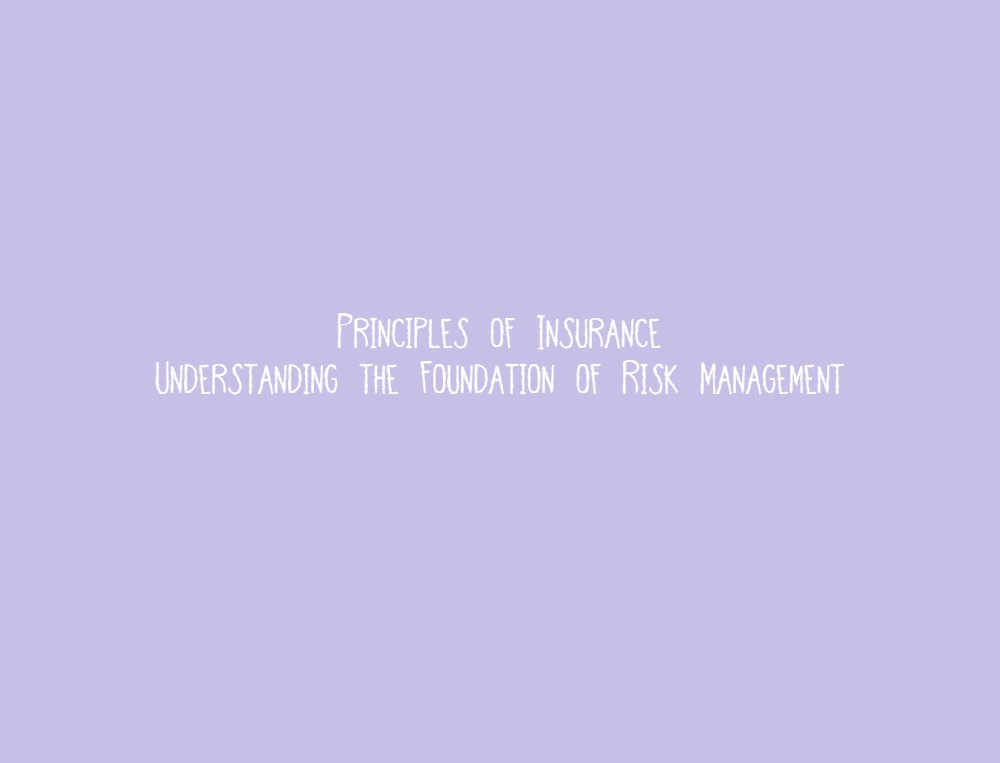
12 October, 2023 19:36

Insurance is an integral part of modern life, providing individuals, businesses, and society as a whole with a mechanism to manage and mitigate various risks. Understanding the principles of insurance is essential for anyone seeking to protect their assets, manage uncertainties, and ensure financial stability. In this article, we will explore the fundamental principles that underpin the insurance industry, shedding light on the key concepts and practices that drive risk management and coverage.
Principle of Utmost Good Faith
The principle of utmost good faith, also known as uberrimae fidei, requires both parties in an insurance contract—the insured and the insurer—to act honestly and transparently. The insured must disclose all relevant information about the risk they are seeking to insure, ensuring that the insurer has a complete understanding of the potential exposures. Conversely, the insurer must provide clear and accurate details about the coverage and policy terms.
This principle is crucial because insurance contracts are based on mutual trust and reliance. It ensures that both parties enter into the agreement with full knowledge and consent, preventing any fraudulent or deceptive practices.
Principle of Insurable Interest:
The principle of insurable interest states that the insured must have a financial interest in the subject matter of the insurance policy. In other words, the insured must suffer a potential loss or be financially impacted in the event of the insured risk materializing. Insurable interest serves as a safeguard against gambling and speculative insurance contracts.
For example, a homeowner has an insurable interest in their property since they would suffer a financial loss if it were damaged or destroyed. Likewise, a business owner has an insurable interest in their business assets or operations. Insurable interest ensures that insurance is used as a risk management tool rather than a means for unjust enrichment.
Principle of Indemnity
The principle of indemnity states that insurance contracts are designed to compensate the insured for the actual loss suffered, without providing an opportunity for financial gain. Under this principle, the insured should not profit from an insured event but should be restored to the same financial position they were in before the loss occurred.
This principle is particularly relevant in property insurance and certain types of liability insurance. For example, if a car is insured for its actual cash value and is damaged in an accident, the insurer will compensate the insured for the repair costs or the vehicle’s market value at the time of the loss, whichever is lower. Indemnity prevents the insured from receiving more than the actual financial loss, thereby discouraging fraudulent claims.
Principle of Contribution
The principle of contribution applies when the insured has multiple insurance policies covering the same risk. It states that each insurer shares the liability proportionally based on the coverage provided. The insured is not allowed to recover more than the actual loss by making claims against multiple policies.
For example, if a property is insured by two separate insurance companies for $100,000 each, and a loss occurs amounting to $150,000, each insurer will contribute 50% of the loss, up to their policy limit. Contribution ensures that no one policyholder benefits more than others and prevents over-insurance or double recovery.
Principle of Subrogation
The principle of subrogation grants the insurance company the right to take legal action against a third party responsible for causing the insured loss. Once the insurer has compensated the insured, they can step into the insured’s shoes and pursue recovery from the liable party.
Subrogation serves two purposes. First, it allows the insurer to recoup the amount paid to the insured, preventing unjust enrichment. Second, it helps keep insurance premiums lower by holding responsible parties accountable for their actions.
Principle of Proximate Cause
The principle of proximate cause determines whether an insurance policy will cover a loss based on the dominant or nearest cause of the event. The insurer will consider the direct cause that set in motion a chain of events leading to the loss.
For example, if a building catches fire due to faulty electrical wiring, the proximate cause is the electrical fire, even if the ultimate cause may be negligence in maintenance. Proximate cause helps insurance companies assess liability and determine the coverage applicability under the policy terms.
Principle of Loss Minimization
The principle of loss minimization emphasizes the insured’s responsibility to take reasonable steps to minimize the loss once an insured event occurs. Insured individuals and businesses should make efforts to mitigate the damages and prevent further losses that could have been reasonably avoided.
For example, in the event of a fire, the insured should promptly contact emergency services, take necessary actions to prevent the spread of fire, and secure the property from further damage. Failure to minimize the loss may result in a reduction in the claim amount or even denial of coverage.
Conclusion
The principles of insurance serve as the foundation for risk management, providing a framework for fair and equitable coverage. By understanding these principles—utmost good faith, insurable interest, indemnity, contribution, subrogation, proximate cause, and loss minimization—individuals and businesses can make informed decisions, secure appropriate coverage, and navigate the insurance landscape more effectively.
Insurance is a dynamic and evolving field, and while these principles form the core of insurance contracts, it is important to consult specific policy terms and conditions to fully understand the coverage provided. By embracing the principles of insurance, policyholders can protect their interests, mitigate risks, and ensure financial stability in the face of unforeseen events.
আপনার মন্তব্য